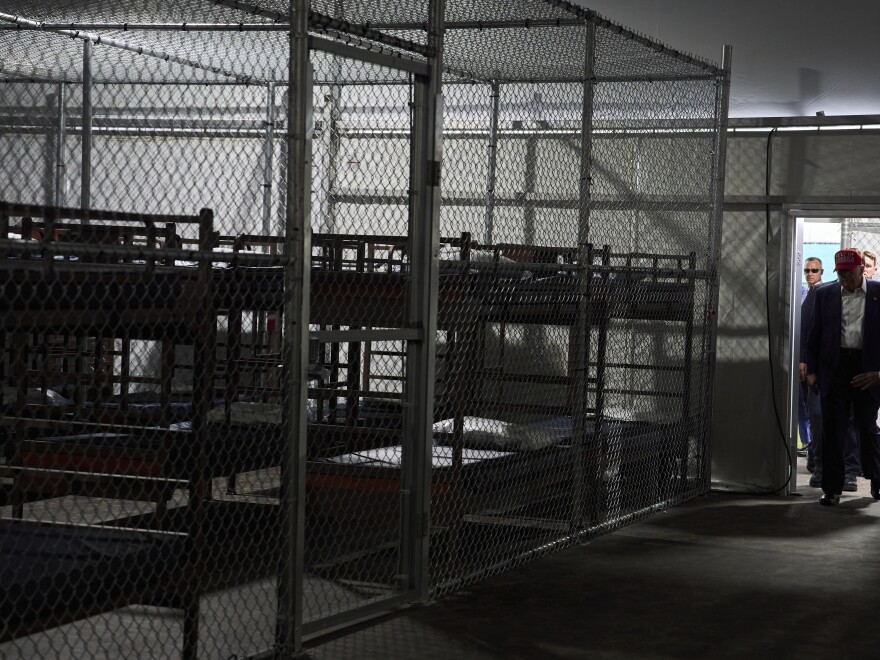Miami On Thursday, a federal judge issued a preliminary injunction, prohibiting further development and directing the closure of an immigration detention facility known as “Alligator Alcatraz” that was constructed in the middle of the Florida Everglades and that environmental organizations claimed violated environmental regulations.
In a multi-day hearing to decide whether to suspend construction until the case’s final settlement, U.S. District Judge Kathleen Williams imposed a temporary stay two weeks ago, which was formalized with her injunction.
Shortly after the decision was made, the state of Florida filed a notice of appeal Thursday evening.
In reaction to the judge’s decision, DeSantis spokesperson Alex Lanfranconi stated, “The deportations will continue until morale improves.”
According to the judge, fencing, lighting, and generators should be taken out of the facility after the detainees are transferred to other prisons, which should reduce the facility’s population within 60 days. Only individuals who are currently being held at the institution may be brought onto the grounds by the state and federal defendants, she added. Existing facilities may be modified or repaired “for the sole purpose of increasing safety or mitigating environmental or other risks at the site,” according to the ruling.
“Those who are in active collaboration or cooperation with” the state of Florida or federal defendants or their officers, agents, or employees are included in the preliminary injunction,” the court stated in an 82-page order.
According to the judge, state representatives never provided a thorough justification for the facility’s necessity in the Florida Everglades. “What is apparent, however, is that in their haste to construct the detention camp, the State did not consider alternative locations,” Williams stated.
Judge cites decades-long efforts to preserve Everglades
According to Williams, the state and federal defendants were given time by her order to shut down the facility and complete the necessary environmental evaluations. She mentioned that the Everglades had been protected for three-quarters of a century.
“Since that time, every Florida governor, every Florida senator, and countless local and national political figures, including presidents, have publicly pledged their unequivocal support for the restoration, conservation, and protection of the Everglades,” she stated. “This order does nothing more than uphold the basic requirements of legislation designed to fulfill those promises.”
During his tour of the facility last month, President Donald Trump hinted that it would serve as a template for other detentions across the country as his administration scrambles to build the infrastructure required for a rise in deportations.
The Miccosukee Tribe and environmental organizations had maintained that until state and federal officials adhered to federal environmental regulations, all new building and operations should be halted. According to their lawsuit, the project will undo billions of dollars’ worth of environmental repair and endanger ecologically delicate wetlands that are home to protected plants and animals.
Friends of the Everglades executive director Eve Samples described the decision as a historic win for the Everglades and Americans who support the preservation of this threatened habitat.
“It sends a clear message that environmental laws must be respected by leaders at the highest levels of our government and there are consequences for ignoring them,” Samples stated in a statement.
Talbert Cypress, the chairman of the Miccosukee Tribe, stated that the tribe has had to defend its rights and territory before.
“We will always stand up for our culture, our sovereignty, and for the Everglades,” in a statement issued by Cypress.
Late Thursday, emailed questions were not immediately answered by state and federal defendants’ attorneys. However, they have previously maintained that even though the detention center would house federal inmates, the federal environmental law did not apply because Florida was solely responsible for the facility’s construction and operation.
According to the judge, the detention center was at least a cooperative effort between the federal and state governments.
Hasty construction of detention center
Nearly two months ago, the prison facility was hastily constructed at a sparsely populated, one-runway training airport in the heart of the Everglades. It was intended to eventually house up to 3,000 detainees in makeshift tent constructions, although it presently houses several hundred.
Chain-link cages enclose rows of bunkbeds within the compound’s big white tents. People detained there claim that mosquitoes and other insects are present everywhere, that toilets don’t flush and that feces overflow the floors, and that worms end up in the meals. In the intense heat, the air conditioners occasionally turned off suddenly. It has been reported that detainees go days without taking a shower or getting their prescribed medication, and they are only able to communicate with their loved ones and attorneys via phone.
At least 20 acres (8 hectares) of asphalt have been added to the site since the Florida Division of Emergency Management started construction, according to testimony given by witnesses representing the environmental groups during the hearing. They warned that more pavement might transport dangerous chemicals into the Everglades, increase water runoff to nearby wetlands, and diminish habitat for endangered Florida panthers.
The complaint was filed in the incorrect jurisdiction, according to attorneys for federal and state authorities, who have asked Williams to either dismiss or move the injunction request. On Thursday, Williams decided that her court was the appropriate location.
Earlier this week, another federal judge in Miami dismissed a portion of a complaint alleging that inmates were denied access to the legal system at the immigration detention facility. The remaining counts of the case were then transferred to a different court.
The Republican governor of Florida, Ron DeSantis, was reportedly planning to construct a second immigrant detention facility at a Florida National Guard training facility in north Florida at the time both lawsuits were being heard.
Copyright 2025 NPR






